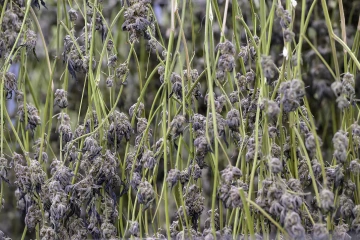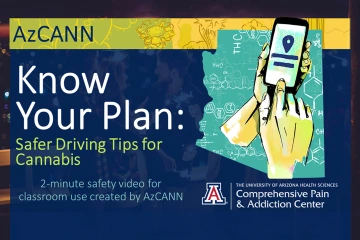Cannabis education program seeks to inform and empower
The University of Arizona Health Sciences’ Comprehensive Center for Pain & Addiction is distributing science-based cannabis information through AzCANN program.

AzCANN, a Comprehensive Center for Pain & Addiction program funded by a grant from the Arizona Department of Health Services, provides education on the responsible use of cannabis by adults.
Business is booming in the cannabis industry. Sales in Arizona surpassed $1 billion in 2023, according to the Arizona Department of Revenue. Forbes reported on a forecast from Brightfield Group, a top market researcher, that estimates national cannabis annual sales will grow from around $32 billion at the end of 2023 to more than $50 billion by 2028.

Cannabis was legalized for adult recreational use in Arizona in November 2020 with the passing of the Smart and Safe Act. Revenue from the recreational market is now three times higher than from the state’s medical marijuana program.
Big business or not, cannabis, also known as marijuana, is still illegal at the federal level. Twenty-four states and the District of Columbia have legalized recreational use of cannabis, and another 14 states permit medicinal use. Cannabis is inching closer toward mainstream acceptance, yet there continues to be a lack of reliable information for health care providers and the public.
The Comprehensive Center for Pain & Addiction at the University of Arizona Health Sciences is seeking to change that.
In Arizona, cannabis was legalized for medicinal use in 2010 and recreational use in 2020. In December 2022, Arizona Cannabis Education, or AzCANN, was launched when Todd Vanderah, PhD, director of the Comprehensive Center for Pain & Addiction and Regents Professor and head of the Department of Pharmacology at the UArizona College of Medicine – Tucson, and Alyssa Padilla, MPH, the center’s operations director, received a $1 million grant from the Arizona Department of Health Services.
The goal? To educate health care professionals about cannabis and empower individuals to make healthy decisions about cannabis use based on personal responsibility and knowledge.
“Research has shown cannabis can be beneficial in the treatment of some conditions, but there are other cases where it can be harmful,” said Padilla, project director for AzCANN. “We are doing our best to help people inform themselves about everything from no use to frequent use. We are providing reliable, accessible and science-based cannabis information for both the general public and health care professionals.”
A need for reliable information
There is scientific evidence that cannabis may help treat neuropathic pain, ease chemotherapy-induced nausea and reduce pediatric seizures; however, the literature is mixed when it comes to many other conditions, and there is still much that is unknown. For instance, when it comes to which strain of cannabis work best for what conditions or how one of cannabis’ main components, delta-9-tetrahydrocannabinol, or THC, interacts with and affects areas of the body, more research is needed.

Before the turn of the 20th century, cannabis was an American cash crop and a common ingredient in many medicinal products. In the early 1900s, cannabis became embroiled in controversy. It was criminalized in 1937.
AzCANN experts say the current shortage of evidence-based information about cannabis is due in large part to federal laws that restrict research and limited funding opportunities.
“Cannabis is already to market, but there is much less information available compared with other medical therapeutics,” said Jennifer S. De La Rosa, PhD, strategy director for the Comprehensive Center for Pain & Addiction and AzCANN’s director of evaluation.
At the same time, there has been a reduction in community stigma and an increase in cannabis availability in states where it has been legalized. De La Rosa, who also is an assistant research professor in the Department of Family and Community Medicine at the College of Medicine – Tucson, says this means more patients are asking if cannabis might treat their condition, and doctors are feeling the pressure.
“Health care providers have sworn an oath to do no harm. They want to know the safety profile of this therapeutic, and they want to know about any possible interactions it might have with other drugs before they give guidance,” she said. “The result is that many providers don’t feel comfortable counseling people on cannabis.”
Getting the information out
AzCANN is filling the need for credible guidance by providing valuable information, not only to health care providers, but also to students pursuing health care careers, adults who use cannabis, and youth who might be considering trying it for the first time.
Several educational resources for health professionals are available, including a classroom lecture video, a professional development seminar and a webinar for clinical professionals that discusses the effects of cannabis on the body.

Safety recommendations and laws about driving and alcohol use are commonly known and readily available. The same cannot be said for cannabis use, which is why AzCANN created a short video, “Know Your Plan: Safer Driving Tips for Cannabis.”
AzCANN also produced a short video on safe driving tips for adults who use cannabis. The video contains information on safe consumption to reduce risk on the road and cites Arizona’s zero-tolerance law for impaired driving. The messages are simple yet effective: “stay put and enjoy the moment,” “designate a driver” and “speak up” about safe travel plans with friends.
“People are using cannabis for a reason, whether for recreation or to treat a condition like anxiety or insomnia. They want to know how they can fit it safely into their lives,” said Sean Cronin, program manager for AzCANN. “Rather than saying, ‘Don’t do this’ or ‘Don’t do that,’ we wanted to provide people with active choices they can make. They can choose to make a plan for relaxing and enjoying their experience in one place, or they can choose to designate a driver.”
Josué Cruz and Elena Cameron, AzCANN health education coordinators, helped moderate breakout sessions with UArizona Heath Sciences students studying in different career fields. Cruz says there is a clear thirst for the information AzCANN provides.
“So much of the information that is out there is just outdated,” said Cruz, who is pursuing a graduate degree through the Mel and Enid Zuckerman College of Public Health. “I think younger people appreciate our harm reduction approach and how we are being completely transparent with everything backed by research.”
Much of AzCANN’s work is possible thanks to partnerships. The Arizona Poison and Drug Information Center at the UArizona College of Pharmacy collaborated on continuing education modules, the Center for Transformative Interprofessional Healthcare helped create a cannabis training event available to students at Arizona's three public universities, and the Arizona Center for Rural Health at the Mel and Enid Zuckerman College of Public Health provided valuable insight and outreach into rural communities to amplify AzCANN’s statewide presence.
“A lot of what people have heard about cannabis comes from an age when cannabis was illegal, but now that cannabis is legal in some states, the messaging needs to change,” Cronin said. “With alcohol, for example, there has been a lot of education on responsible consumption. We want to equip people with that same kind of knowledge about cannabis.”
Our Experts
Todd Vanderah, PhD
Director, Comprehensive Center for Pain & Addiction
Regents Professor and Head, Department of Pharmacology, College of Medicine – Tucson
Co-Director, MD/PhD Dual Degree Program
Assistant Vice President, Research and Innovation, Global MD Program
Professor, Department of Anesthesiology, College of Medicine – Tucson
Professor, Department of Neurology, College of Medicine – Tucson
Member, BIO5 Institute
Member, Cancer Biology Program, UArizona Cancer Center
Alyssa Padilla, MPH
Operations Director, Comprehensive Center for Pain & Addiction
Jennifer Schultz De La Rosa, PhD
Strategy Director, Comprehensive Center for Pain & Addiction
Assistant Research Professor, Family and Community Medicine, College of Medicine – Tucson
Sean Cronin
Project Manager, AzCANN
Contact
Brian Brennan
University of Arizona Health Sciences Office of Communications
520-621-3510, brianbrennan@arizona.edu

